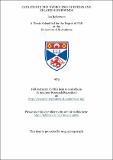Catalysis in the hydrolysis of esters and related compounds
Abstract
The first chapter is concerned with an investigation into the kinetics and mechanism of the base-catalysed hydrolysis of some substituted phenyl chloroformates. A study of kinetic isotope effects and activation parameters for the hydrolysis of phenyl chloroformate indicates that acetate ion and pyridine act as nucleophilic catalysts. Both the spontaneous and pyridine catalysed hydrolyses of substituted phenyl chloroformates fit a Hammett plot. The effect of solvent polarity and added salt indicates that there is little charge separation in the transition state for hydrolysis. The mechanism of reaction is discussed. The results of an investigation into the role of nucleophilic and general base catalysis by pyridine and methylpyridines in the hydrolysis of aryl acetates are presented in Chapter 2. Activation parameters for several of these reactions have been determined. The size of the kinetic isotope effect indicates nucleophilic catalysis. Substitution at the 2-position in pyridine prevents nucleophilic catalysis, but a much slower general base catalysed pathway was detected, and it is argued that this occurs even when nucleophilic catalysis appears to be the mechanism. The third chapter is concerned with the study of micelle effects in the base-catalysed hydrolysis of aryl acetates. It was thought that the base 2(2-hydroxyethyl)-pyridine, in which nucleophilic catalysis due to the nitrogen is effectively blocked by substitution at the two position, would have a tendency to form intramolecular hydrogen bonds within the hydrophobic micelle environment, and hence to enhance the nucleophilicity of the hydroxyl group. No evidence was found to suggest that such a process occurs in the micelle solutions used, but the hydrogen-bonded configuration is shown to be formed in carbon tetrachloride solution. Substrate substituent effects in the enzymatic hydrolysis of a series of aryl acetates are investigated in Chapter 4. It is found that substituent effects can change the observed enzymatic mechanism. The possession of a 4-nitro substituent by the substrate is also shown to be of mechanistic importance. An analogue computer was used to simulate the kinetic results, and factors involved in the change of mechanism are discussed.
Type
Thesis, PhD Doctor of Philosophy
Collections
Items in the St Andrews Research Repository are protected by copyright, with all rights reserved, unless otherwise indicated.

